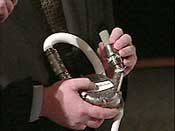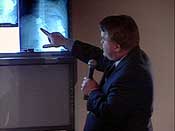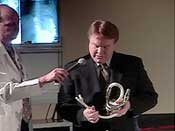 |
|||||||||
|
Education Feature Stories: Other News: |
|
Offers Community Members Insights into Medical Education
Eighty local community members got a taste of medical school during the first UW Mini-Medical School pilot program. During the weekly series, held Feb.7 to March 21, 2001, faculty members demonstrated their passion for teaching and educating students in a variety of medical disciplines. Curriculum for each week’s presentation was chosen to broaden the Mini-Medical School student’s knowledge of anatomy, physiology and various disease states. Participants left each session with insights into medical research and the School of Medicine’s role in advancing quality health-care in the region. These were not traditional students; most were community leaders and UW supporters.
The interactive lectures included explanation of body systems with video presentations as well as hands-on participation, such as operating a defibrillator and practicing a biopsy on a 40-pound cow liver. Dr. Carlos Pellegrini, professor and chair of surgery, presented unique footage of videoendoscopic surgery that portrayed the effects of the 6.8-magnitude Nisqually earthquake Feb. 28, 2001, as seen from the inside of the patient’s abdominal cavity.
 |
 |
 |
|
Heart transplant surgeon Dr. William Curtis demonstrates a left-ventricular assist device during one of the Mini-Medical School classes on cardiology advances. |
||
Patients helped teach Mini-Medical School participants. One young woman discussed how her life changed after receiving counseling about her genetic predisposition toward breast cancer. She appeared during a presentation with Dr. Mary-Claire King, professor of genetics and medicine in the Division of Medical Genetics, and Dr. Julie Gralow, assistant professor of medicine in the Division of Oncology. Dr. Dan Fishbein, associate professor of medicine and head of the Congestive Heart Failure and Heart Transplantation Program, introduced a young man awaiting heart transplantation who was surviving with a left-ventricular assist device in place. Dr. Steven Cramer, assistant professor of neurology, had a lively and compassionate interchange with an elderly stroke patient who demonstrated how rehabilitation improved her aphasia as she sang for the students.
“Ordinarily, I just speak to one patient at a time,” noted Cramer. “This group was engaged and curious, thereby making the talk a pleasure to give. I was happy to have the opportunity to describe the nature of my stroke recovery investigations, and to speculate with the students upon the future of stroke research.”
Other topics covered in the first Mini-Medical School series included the diagnosis and treatment of coronary disease, treatment of adult respiratory distress syndrome, the mechanics of the shoulder joint, and strategies for good doctor/patient communication. Presentations were followed by demonstrations of new treatment technologies and informal discussions in which students had the opportunity to ask faculty specific questions.
On the last evening of the program, Mini-Medical School students received certificates of participation from the Dean of the UW School of Medicine, Dr. Paul G. Ramsey. Tapes from the Mini-Medical School lectures are being broadcast on UWTV. Future Mini-Medical Schools are planned.
|
| UW AMC Medical Center | UW School of Medicine | Harborview | UW MC | Search UW AMC | UW Home | Contact Us | ©2001-2002, University of Washington Academic Medical Center. All rights reserved. Please honor our copyrights. |
|